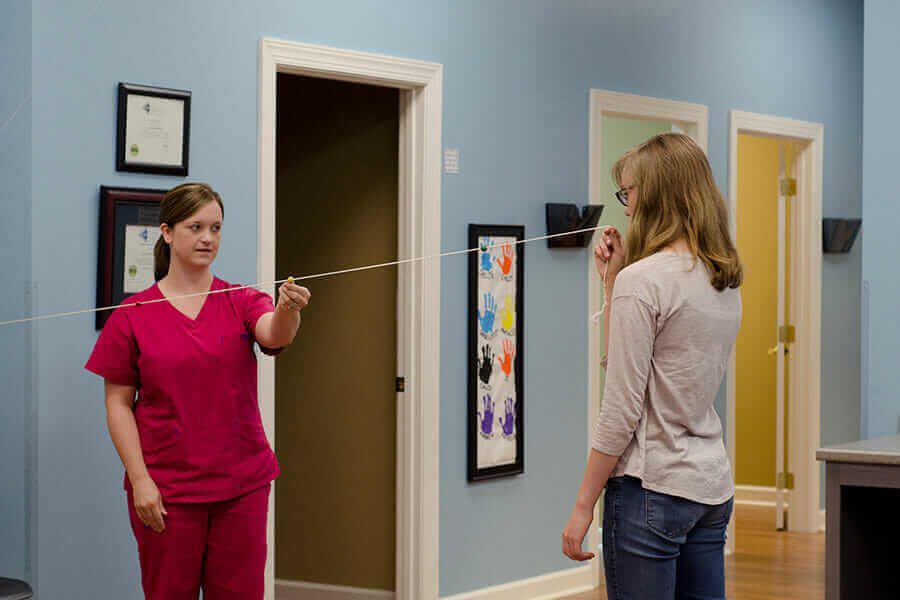Improving visual outcomes for patients with Nystagmus: How neuro optometrists enhance vision and quality of life for patients with nystagmus
A wide variety of optics, therapies, prisms, filter lenses, and computerized low vision aids may be prescribed to reduce the symptoms of nystagmus.
Using Prisms to Improve Nystagmus Symptoms: How Neuro-Optometrists Utilize this Technique
Prisms are a powerful tool in the arsenal of neuro-optometrists for treating nystagmus. These specialized lenses, when added to eyewear, can improve the patient's appearance by changing the null position, the position in which the nystagmus is least severe, to a more normal position. Additionally, prisms can be used to induce more convergence, or turning in of the eyes, which can reduce nystagmus symptoms.
Magnification
Magnification can help to slow eye movements for many patients which may assist in tasks like writing or reading. There are many types of magnification available including handheld magnifiers, stand magnifiers, digital CCTV magnifiers that are both portable and desktop, and magnification that is worn in glasses.
Adjusting brightness and reducing glare
Light sensitivity is common among people with nystagmus. You can often improve your vision quality by adjusting the brightness, changing font size, and adding filters to enhance visual contrast on your computer screen.
Electronic devices to enable reading and reduce dizziness
There are a variety of technologies that use OCR technology to read text without needing to strain the visual system. One of the most advanced options is OrCam which incorporates cutting-edge technology that helps adults and kids with nystagmus have text read to them in their ear. This can lead to a dramatic improvement in the quality of life for a patient with nystagmus who struggles to read, use a cell phone, or do other reading tasks, and may also lessen headaches and dizziness when reading, using a digital device, or copying from the classroom board.
Contrast sensitivity training
A recent clinical study presented at the annual meeting of the European Strabismus Association found that 80% of patients with congenital nystagmus who underwent treatment with the RevitalVision program experienced an average improvement of 2 lines on a visual acuity chart. This substantial progress allowed some patients to even qualify for a driving license.
Vision Therapy for Nystagmus
Nystagmus is an eye condition in which one or both of the eyes make involuntarily repetitive eye movements, which can result in reduced vision, depth perception, and difficulty with balance and coordination. Vision therapy is a personalized program that can help remediate these symptoms by addressing the underlying causes of nystagmus.
One form of vision therapy that has been found to be effective in treating nystagmus is Syntonics. Syntonics is a type of therapy that utilizes colored filters to send coded signals to the brain, which can help to slow down or stop the involuntary eye movements associated with nystagmus. This therapy can also help to improve focus and clarity, restore the electrical connection between the brain and eyes, improve binocularity and alignment, and establish depth perception.
Vision therapy and syntonics can impact the vision and quality of life of a person with nystagmus by:
- Slowing down the involuntary rhythmic motion of the eyes in order to regain proper fixation.
- Improving focus and clarity.
- Restoring the electrical connection and fostering improved communication between the brain and eyes.
- Improving binocularity and alignment
- Establishing stereopsis (depth perception)
Prescription lenses
Prescription eyeglasses or contact lenses can help reduce refractive errors, such as myopia, hyperopia, and astigmatism in patients with nystagmus. This can improve their vision and make daily tasks, such as reading and driving, easier to perform. Additionally, some special types of glasses and contact lenses are designed specifically for people with nystagmus that may help reduce the symptoms of the condition.
Refractive surgery
It is important to note that while strabismus surgery may help to improve the alignment of the eyes and reduce head tilts, it is not a complete treatment for nystagmus. Additionally, it is important to note that not all cases of nystagmus are suitable for surgery and it is important to consult with our eye doctor and an ophthalmologist to determine if surgery is an appropriate option for you.
It's also worth mentioning that even if surgery is performed, it's not a guarantee to completely stop the eye movements and it's not able to improve the visual acuity. It's important to have realistic expectations and to consider all the options for treatment before making a decision.
Discontinuing medication
While discontinuing certain medications may improve nystagmus symptoms, it should only be done under the guidance and supervision of a healthcare professional. Medications may be essential to the treatment of other underlying conditions, and stopping them abruptly could have serious consequences. It is important to work closely with your healthcare team to determine the best course of treatment for your specific condition.





















